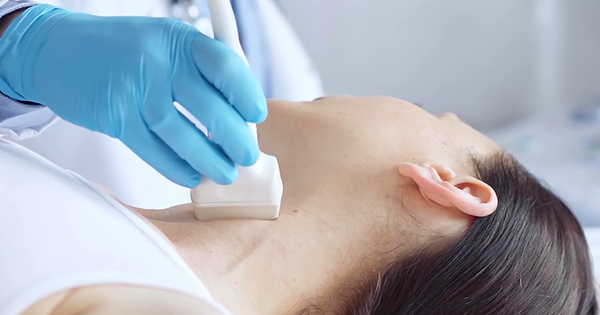Thyrotoxicosis is a condition in which there is too much thyroid hormone in the body, which can cause diarrhea, rapid heartbeat, and tremors.
People with thyrotoxicosis also have low levels of thyroid-stimulating hormone (TSH) in their blood. Thyrotoxicosis differs from hyperthyroidism in that it is caused by increased thyroid hormones and secretion from the thyroid gland.
Symptoms of thyrotoxicosis are caused by high levels of thyroid hormones in the blood, which increase the metabolic rate. Metabolic rate is the rate at which the body uses energy or burns calories.
Mild thyrotoxicosis often causes no symptoms, most people have symptoms when the condition becomes severe.
People with severe thyrotoxicosis may experience diarrhea, rapid weight loss, increased or decreased appetite; tremors, especially in the hands; sweating, and a rapid heartbeat. Mood changes, feeling hotter than usual, thinning hair, swelling or nodules on the thyroid gland; and skin problems such as redness and itching are also signs of thyrotoxicosis.
People with autoimmune thyroid disorders such as Graves' disease and Hashimoto's thyroiditis may experience eye problems (bulging, dry, and swollen eyes), swelling of the fingertips, and thick, red skin on the lower legs.
Thyrotoxicosis also affects menstruation and causes irregular menstrual cycles. If thyrotoxicosis is severe, it can lead to fertility problems.
Common conditions that lead to thyrotoxicosis are Graves' disease, subacute thyroiditis, Plummer's disease, and toxic adenoma.
Graves' disease is an autoimmune disorder that causes inflammation that damages the thyroid gland. It is more common in women and people between the ages of 30 and 50. The risk of Graves' disease is higher if another family member has the disease. People with rheumatoid arthritis or lupus also have an increased risk of Graves' disease.
Subacute thyroiditis is an acute inflammation of the thyroid gland caused by a virus or respiratory infection. During the first few weeks, the patient has signs of thyrotoxicosis, including an enlarged and painful thyroid gland. Pain from the thyroid gland may radiate to the jaw or ear. The patient is uncomfortable, has a fever sometimes reaching 40 degrees Celsius, and has muscle and joint pain.
Subacute thyroiditis is usually temporary, but it can cause some permanent complications if left untreated. An example is thyroid storm, in which the heart rate, blood pressure, and body temperature rapidly increase to very dangerous, life-threatening levels.
Toxic multinodular goiter (Plummer) : This condition causes the thyroid gland to enlarge, causing difficulty breathing and swallowing, hard nodules (lumps), and overproduction of hormones. Women over 55 are at higher risk.
Iodine deficiency is also a factor that increases the risk of Plummer's disease. Iodine is an element needed to produce thyroid hormones.
Symptoms of Plummer's disease are similar to those of thyrotoxicosis, including heat intolerance, muscle weakness and twitching, excessive fatigue, tremors, unintentional weight loss, and diarrhea.
Toxicologic adenomas cause the thyroid gland to become overactive, causing it to enlarge and produce too much hormone. They cause similar symptoms, have the same causes, and have the same risk factors as Plummer's disease.
Hashimoto's toxicity is the initial stage of Hashimoto's thyroiditis, an autoimmune disease. This is a temporary thyrotoxicosis that causes increased release of thyroid hormones, leading to destructive inflammation of the thyroid gland.
The signs of Hashimoto's thyrotoxicosis are similar to other types of thyrotoxicosis, ranging from mild to moderate.
Other causes of thyrotoxicosis include ovarian cancer, thyroiditis, thyroid treatment, and certain medications. For example, antiarrhythmic drugs can stimulate the thyroid gland and cause overproduction of thyroid hormones or damage the organ. Damage, such as inflammation, can cause excess hormones to be released into the bloodstream, causing thyrotoxicosis.
Mai Cat (According to Very Well Health )
| Readers ask questions about endocrine diseases here for doctors to answer |
Source link







![[Photo] Visiting Cu Chi Tunnels - a heroic underground feat](https://vstatic.vietnam.vn/vietnam/resource/IMAGE/2025/4/8/06cb489403514b878768dd7262daba0b)


















































































Comment (0)